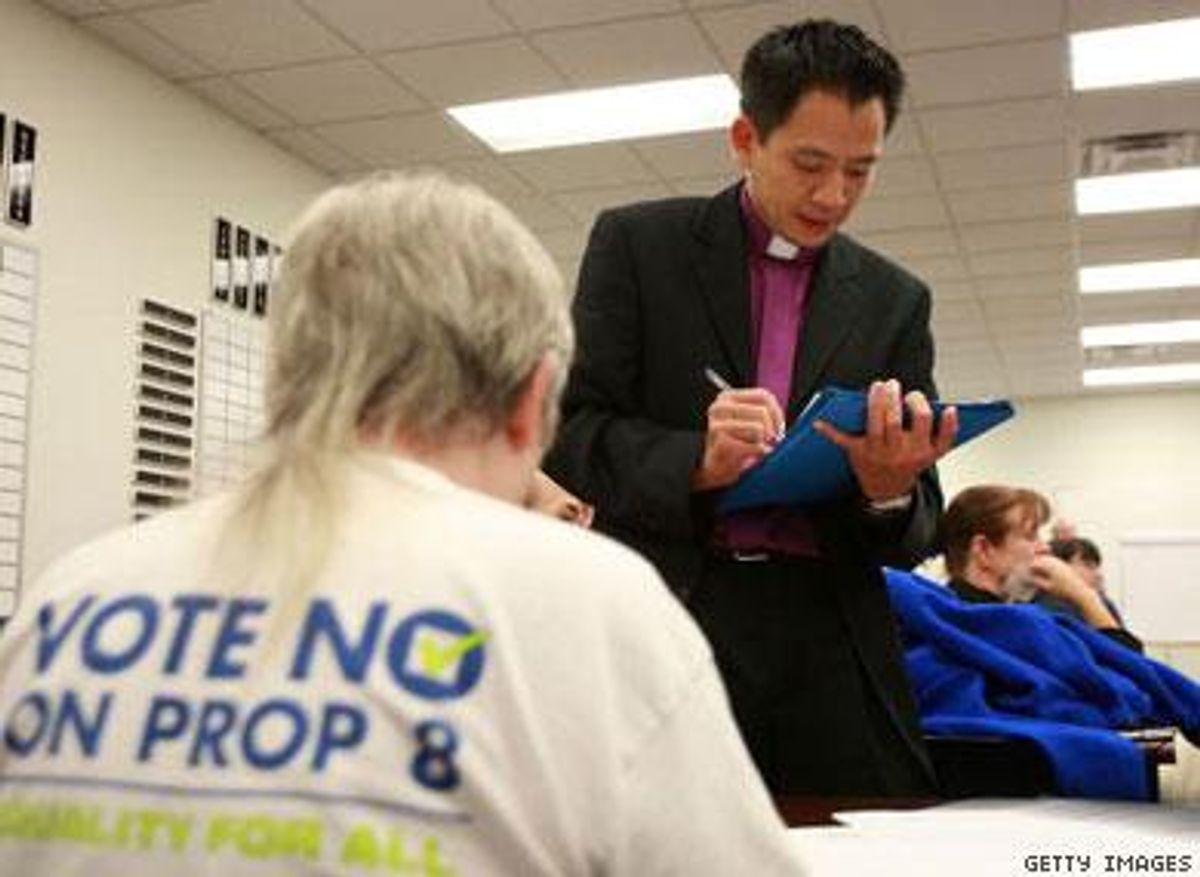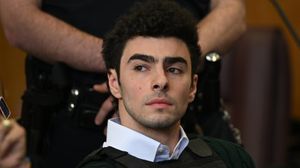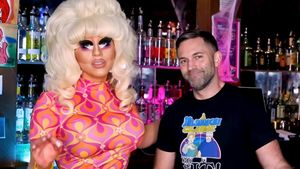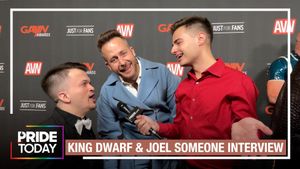The No on 8
campaign headquarters is located on San Francisco's
Market Street in a space that was once the home of
Tower Records. Dance mix CDs and DVD displays have
been replaced with table after table of volunteers,
who on the last Wednesday before the November 4 election are
working their cell phones to encourage Californians to
vote no on the ballot measure. If passed, Proposition
8 would ban same-sex marriages in California just
months after the state supreme court voted narrowly to
strike down laws preventing gay and lesbian couples from
getting hitched.
Considering the
polls showing 8's potential passage, the onslaught of
out-of-state money raised by the Yes on 8 campaign, and the
damage done by Yes on 8 ads featuring scared
parents and vulnerable children, I expect to find a
much more tense, scared office. But the receptionist
seems to represent the energy of place: focused,
businesslike, and surprisingly calm.
I'm there
to see Patrick Guerriero, who less than a month ago became
No on 8's campaign director. The former
president of the Log Cabin Republicans, Guerriero now
runs the Colorado-based Gill Action Fund, an issue
advocacy organization founded by gay software mogul Tim Gill
that promotes LGBT political rights. After being
ushered into a smaller set of offices that are
nonetheless full with No on 8's media team and a
"war room"-like conference call
among No on 8 staffers, Guerriero comes out of an even
smaller room, working his BlackBerry. It's clear that
if you told Guerriero six weeks ago he would be in
California working full-time on the fight of his life,
he would have said you're crazy.
"I just
came to visit in late September to check on the status of
the campaign and to offer support from Gill
Action," he said. "Right about the time
I came here there was a growing awareness the Mormon church
had basically made an unprecedented financial
commitment to raising a record amount of money in a
social issue campaign."
During the
summer, No on 8 organizers were estimating $20 million would
be needed to defeat the amendment, and with early polls
showing a lack of support for Proposition 8 and a
fairly muted opposition that hadn't yet
launched a media campaign, the No campaign appeared on
track.
But the October
fund-raising report brought No on 8 supporters
cataclysmic news. Proposition supporters, with major help
from very organized out-of-state Mormon donors, had
raised $25 million and boasted $12 million in the
bank, while No on 8 had raised only $15 million with a
measly $1 million in the bank.
"I should
show you the sheet," Guerriero said of the report.
"I keep it as a reminder in my office."
With a series of
ads that equated a No on 8 vote with mandatory gay
marriage instruction in public schools and a not-so-veiled
threat that newly married gays and lesbians were after
the children of God-fearing families, the Yes on 8
forces launched what Guerriero called a "shock and
awe television and radio bombardment into the homes of every
Californian."
On October 7,
Equality California's executive director Geoff Kors
and senior strategist Steve Smith held a conference call
announcing any lead in the polls was gone and the LGBT
community needed to stop being complacent and get
organized quick. Kors and others in the No on 8
campaign asked Guerriero to stay and help the effort.
But what does a
Republican who has never lived in California, let alone
run a statewide ballot initiative in the seventh-largest
economy of the world, bring to the table?
"I'm smart enough to know what I know, and
smart enough to know what I don't know,"
Guerriero answered. "My job was to help the campaign
run a very disciplined shop to try and come back
financially, which thankfully because of the
unbelievable surge of donations, has happened."
Guerriero
jokingly calls himself a "German
schoolteacher" when it comes to keeping
campaigns in order. He didn't want to name names, but
one of his chief duties has been to bring in top-tier
political talent to everything from No on 8's
fund-raising operation to its media campaign. A number
of Hillary Clinton campaign veterans, along with operatives
who know the California proposition landscape and
staffers from Massachusetts who helped make marriage a
reality in the Bay State, have all come on board over
the past few weeks.
"You go
around the offices here and start asking people where you
were a month ago, there are a lot of stories of people
who basically gave up their life and to donate their
time," he explained. "They are some of the
best and brightest political minds in the country."
As of Wednesday
morning, the financials were neck and neck, with the Yes
camp racking up a total of $32.4 million. But in a crucial
switch, the No on 8 forces had edged their opponents
out with $32.6 million. During our interview,
Guerriero took a call that sealed the deal on an additional
$500,000 from an individual donor. Support from other
progressive organizations plus the teachers and nurses
unions have also been critical, but Guerriero was
quick to point out the huge amount of small donations
that have come through on No on 8's revamped website.
Guerriero talked about the "hotel workers,
janitors, college students" who have helped
close the cash gap.
There has been
plenty of grousing about the campaign's early
decisions, which included what some critics called an
ad campaign that seemed to ask for permission to
marry, as opposed to saying no to discrimination.
Guerriero didn't want to talk about past mistakes,
and instead noted what the LGBT community has been
able to do in such a short amount of time since the
state supreme court decision is nothing short of amazing.
"A lot of
states will never see a $40 million campaign," he
said. "This is the single most expensive and
most intense social issue fight in the history of the
country. And that's not hyperbole, that's
fact."
The media revamp
has included a new Spanish-language push, with ads
running on Spanish-language media outlets featuring Ugly
Betty stars America Ferrerra, Tony Pena, and Ana
Ortiz. Getting the ads done was a challenge,
considering the three actors were in New York and the
campaign had less than a few days to write, produce, and
distribute the ads.
"That spot
seems to be touching people," said one of
Guerriero's colleagues, a senior executive at a
major media company who took a leave of absence to
work full-time on the campaign. "Young Latinos were
looking for a way to talk about this with their
parents. They didn't feel comfortable having
that conversation in Spanish. This is definitely
filling a need."
Guerriero is
bullish on what looks to be record Democratic turnout in the
bluest of blue states. "We need the vast majority of
Democrats to do the right thing," he said.
"If we get a third of Republicans that would be
terrific. We need a real surge in young people on college
campuses to show up. We have messages that speak to
the entire state, but the most important thing in a
federal election with great turnout is that the
Democratic and independent voters who are inclined to be
supportive show up in great numbers and remember to
vote down ballot."
The campaign has
looked at a number of different variables, including the
possibility of lower-than-usual social conservative turnout
thanks to presidential hopeful John McCain's
campaign, an increase in youth voting, and record
turnout from African-American voters, who in the past have
not been as supportive of LGBT issues as other
Democratic Party voting blocs.
"We're more interested in trends than exact
numbers," Guerriero said. "What's
more important is communicating with voters and leaving no
stone unturned."
Despite all the
newfound momentum, Guerriero's task is daunting.
While I am in the Market Street office, the
campaign's IT team -- a collection of A-listers
from many of Silicon Valley's biggest firms -- is
confounded by a shutdown of the No on 8 website. A few
hours later they will discover they were attacked by
mystery hackers, but not before slowing down online
fund-raising.
With just a few
days to go, Guerriero explained the shift has gone from
phone-banking to getting volunteers out into the field, with
the goal of having 20,000 No on 8 backers on the
streets on Election Day. If the Yes on 8 campaign
lives up to its claims, hundreds of thousands of its
supporters, organized by conservative churches including the
Mormons, could be canvassing and campaigning on
November 4 as well.
But the big
question still remains -- is it too little and too late to
fight against an organized opposition that raised more than
double the early estimates? Guerriero notes
propositions are won or lost in the last four weeks of
the campaign, as Californians finally sit down and read
through their ballot initiatives. "The public is
plugging in," he said.
Guerriero has
just finished up his half-million-dollar phone call, and a
staffer is pushing him to stick to his schedule, which
includes a working dinner off-site. He's eyeing
his BlackBerry as it continually buzzes, but he seems
at peace with the campaign.
"When the
polls close at 8 on Tuesday, you can never be too confident
about the results, but you can be very proud of the fact
that this campaign and the leadership here did
everything it could to win," Guerriero said.
"And that's all you can do."



















































































